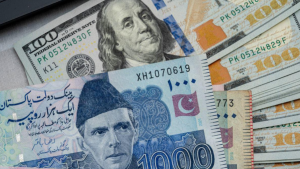[ad_1]
ISLAMABAD: The National Assembly approved the tax-laden Finance Bill 2024 for the fiscal year 2024-25 as the federal government eyes a new International Monetary Fund (IMF) bailout package for sustaining the economy.
The federal budget 2024-25, with a total outlay of Rs18.877 trillion, was passed on Friday after the motion moved by Finance Minister Muhammad Aurangzeb won a majority vote in the National Assembly.
Minister for Finance and Revenue Muhammad Aurangzeb moved the motion for consideration of the Finance Bill, 2024, which was unveiled by the federal government two weeks ago, to give effect to the financial proposals of the federal government for the year, commencing on July 1, 2024.
The finance bill moved by Muhammad Aurangzeb in the lower house of the parliament was endorsed by the ruling alliance, including the Pakistan Peoples Party (PPP). However, opposition parties, mainly SIC parliamentarians backed by Pakistan Tehreek-e-Insaf (PTI), have rejected the budget, saying it will be highly inflationary.
All the amendments, presented by the opposition members, were also rejected during the budget debate.
Opposition leader Omar Ayub said, “The finance bill fails to address the critical economic challenges faced by the country and has been drafted without adequate consultation with the key stakeholders.”
Rejecting the federal budget, Chairman PTI Gohar Ali Khan said that his bill is not reflective of the people’s aspirations or the country’s economic realities.
The federal government has set a target of Revenue collection of the FBR at Rs12,970 billion during the upcoming fiscal year. Finance Minister Senator Muhammad Aurangzeb during the budget speech said that the target of non-tax revenue for the new financial year has been set at Rs4845 billion rupees.
According to the budget document, the target is to get Rs30 billion rupees from privatization. The target of direct tax collections for the next year is Rs5512 billion and Rs5454.6 billion from income tax. The capital value tax for the next fiscal year has been increased by Rs5 billion to Rs15.66 billion. A tax collection target of Rs1591 billion rupees has been set for customs duty.
According to the budget document, a target of Rs 4,919 billion has been set for sales tax and Rs 948 billion for excise duty. The federal government has set an ambition to collect Rs1.28 trillion through the petroleum levy in the upcoming fiscal year.
The revenue collection target of the outgoing fiscal year through petroleum levy was Rs869 billion, which saw an increase of 47.4pc from the outgoing year. The government recommended an increase in the levy from Rs60 to Rs80 per litre.
In the budget grants amounting to Rs1,777 billion for the promotion of the Benazir Income Support Programme (BISP), Azad Jammu and Kashmir (AJK), Gilgit-Baltistan, merged districts of KP, Higher Education Commission, Railways, and IT sectors have been allocated.
To ensure equitable development in AJK, GB, and merged districts of the KP, the government has allocated 10 percent and around 11 percent for other sectors of development including IT, telecom, science and technology, governance, and production sector.
[ad_2]
Source link





